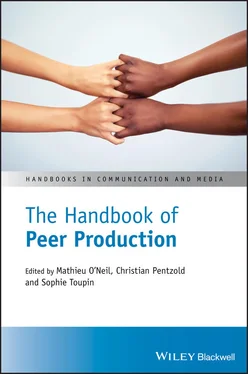In sum, protection from abuse in peer production is provided by the community, rather than by state‐backed contracts, so recourse procedures may be unstable; nonetheless, Kreiss et al.’s (2011) assessment that peer organizations offer no protection from unjust domination is incorrect. It remains the case that the legal protection of (for example) the GPL applies to the result of labor, not to workers themselves. Peer organizations are not legally responsible for the welfare of participants, so do not offer the same level of support as formal bureaucracies do (O’Neil, 2015).
How do contemporary collectivist organizations fit into the wider political economy? Table 1.1maps contemporary configurations of work according to their extrinsic or intrinsic logic (vertical axis) and to the degree of control workers are afforded over their labor (horizontal axis).
Organizations where workers sell their labor for wages and where decision‐making rests with a restricted leadership are situated in quadrant A. In contrast to employees of capitalist‐centralized firms, independent workers such as informal networks of tradespeople in quadrant C have much greater latitude as to whether to work on a particular job. Quadrants B and D comprise communal forms of labor. The community validation and self‐fulfillment of domestic labor are lesser than those accrued by participants in voluntary/collectivist associations, but they exist nonetheless. Indeed, Marxist feminist scholar Kylie Jarrett (2016) draws a comparison between the affective or reproductive work of traditional housewives and the unpaid labor performed by contributors to digital platforms. But where workers in quadrant D have control over their production, workers in quadrant B who freely engage in consumption work (or its more interactive variants “prosumption” and “co‐creation”) must accept that their contributions to product development or networked communication are subject to an external authority's approval or disapproval, with no possibility of redress: this distinction is perhaps not sufficiently drawn out in Jarrett’s (2016) otherwise excellent book, which conflates FOSS labor with that of Facebook users for example.
Table 1.1 Organizational governance and logic: a typology.
Source: O’Neil, M. (2015). Labour out of control. The political economy of capitalist and ethical organizations. Organization Studies, 36(12): 1627–1647. © 2015 SAGE Publications.
|
Capitalist logic (“alienated” labor) |
Ethical logic (“communal” labor) |
| Centralized governance |
A private firms, public administration, non‐governmental organizations |
B consumption work, co‐creation, prosumption |
| Modular governance |
C independent workers, freelancers, contractors |
D domestic labor, voluntary/collectivist organizations |
In contrast, maintainers in ethical free and open source software projects must take pains not to antagonize contributors, who may not only vote with their feet and exit the project, but have the capacity to use all produced resources and therefore reproduce and “fork” the project into a different direction. Actors may move from one quadrant to another: hobbyists can strike it big and grow into large centralized firms (D=>C=>A), as in the case of computer operating systems or search engines developers. Domestic labor can be contracted out (D=>A/C); firms may attempt to glom onto the energy and creativity of consumers (B=>A) or of collectivist organizations (D=>A) to foster innovation and reduce costs.
4.3 How Capitalism Co‐opts Peer Production: The Case of Free and Open Source Software
Early critical understandings of Californian Internet culture (Barbrook & Cameron, 1996), of online communities (Terranova, 2000), and of computer hacking (Wark, 2004) took it for granted that capitalist interests would seek to capture autonomous online labor, though these accounts were in the main written when this co‐optation was an interesting novelty, rather than a central component of IT firms’ business model, as it is today. But how did the integration of communities of peer producers into the “ecosystems” of firms come about?
Boltanski and Chiapello (2005) had presciently argued in their book on the “new spirit of capitalism,” originally published in 1999, that capitalism uses critique to rejuvenate itself, by integrating the 1960s countercultural critique of tradition, boredom, and hierarchy. This helped to justify the freeing of capital, the deployment of anti‐welfarist ideology, the weakening of the state and the erosion of organized labor by emphasizing personal liberation rather than social emancipation, which alleviates exploitation. To these insights Fisher (2010) added the legitimizing function of a technological discourse in which hackers are a central productive force. Similarly for Barron (2013), FOSS exemplifies a particularly pure form of the “new spirit of capitalism”: a post‐Fordist regime of accumulation, arranged around lean firms working as networks with a multitude of participants, organizing work in the form of teams or projects, intent on customer satisfaction, and a general mobilization of workers thanks to their leaders’ vision.
In an article detailing how hacker practices and innovations are adopted, adapted, and repurposed by corporate and political actors, Delfanti and Söderberg (2018) reprise the notion that assimilated critiques serve to legitimize capitalism and suggest that hacking itself is being hacked, as “the very idea that tinkering offers a way to subvert the agendas of the powers‐that‐be has become a foundational myth of contemporary capitalism” (p. 461). Beyond repurposing, technical innovations such as modularized production and distributed mesh networks and retrieval systems are now “integrated in the material infrastructure of capitalism” (p. 476), and coupled with distrust for incumbent actors, aka “disruption.”
Christopher Kelty’s (2008) influential definition of FOSS projects as “recursive” is key to understanding how what was once perceived as a force resisting privatization has been integrated into dominant circuits of capital. Hackers have extremely divergent politics, but they all agree that proprietary software and intellectual property rights, as well as surveillance and censorship, should be rejected. This stems from the fact that such an opposition constitutes the techno‐legal preconditions for the hacker public to exist as such: “recursive politics” aim to consolidate and grow the material conditions for the survival of this public. In contrast issues such as feminism and workers’ rights are not “recursive” in the sense that hackers “perceive them to be unrelated to what really matters to them the most, computers and Internet freedom” (Delfanti & Söderberg, 2018, p. 463). This was the key for the disruptive potential of FOSS to be tamed: all firms needed to do was to adopt hackers’ core demand (providing access to code through “open” licenses) to ensure that participants could continue to help their environments thrive. The ethical logic of self‐fulfillment and the focus on technical excellence did the rest, imbuing projects with a propensity to accept any valid contribution (irrespective of whether it originates from a commercial or communal setting) and an aversion to discussing questions of subsistence (“who can afford to take part?”), as such discussions complicate the notion that contributions are solely evaluated on merit.
The integrated firm‐project economic model raises the issue of the sustainability of projects. As Nadia Eghbal observed in her Roads and Bridges report: “fundamentally, digital infrastructure has a free rider problem” (2016, p. 106). This tension had been noted since the beginning of FOSS development, when firms were described as harvesting the altruism of volunteer developers (Haruvy et al., 2003), resulting in a relationship between altruistic individuals and selfish firms (Bonaccorsi & Rossi, 2004). That firms are benefiting from the free labor of volunteers situate FOSS and peer production more generally within the same exploitative historical trend exemplified by domestic work. This is a move made by Kylie Jarrett (2016, 2019) who argues, in line with past feminist critiques (Dalla Costa & James, 1972), that unpaid domestic labor is crucial for capitalist production and reproduction. The binary between production and reproduction work renders essential forms of labor invisible.
Читать дальше


![О Генри - Справочник Гименея [The Handbook of Hymen]](/books/407356/o-genri-spravochnik-gimeneya-the-handbook-of-hymen-thumb.webp)









